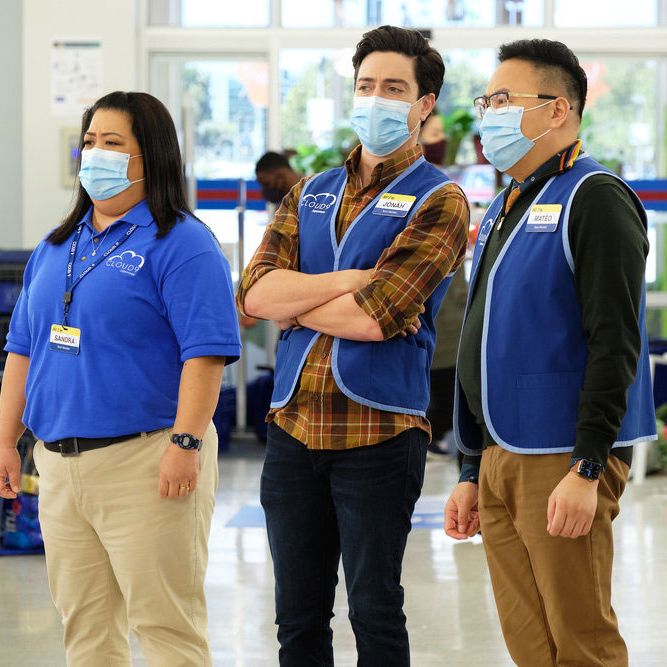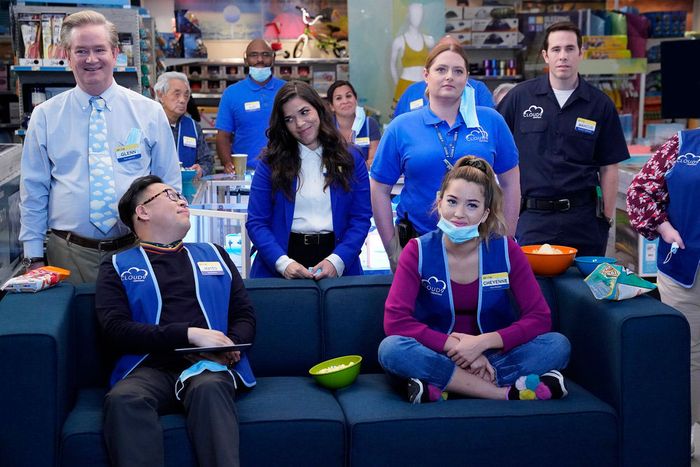
In March 2020, the people who make the NBC sitcom Superstore were staring at a series of problems. Some were the same problems facing many American TV shows that spring. “The first conversations that we and every other TV show that shoots in modern America had was, By the time this airs, are we ready to laugh?” Superstore star Ben Feldman told me. “Are we sick of it? Do we hate them for shoving COVID in our face when we just came to TV to escape? Is it comfortable to see on TV? Is it something we expect because we need to see something we recognize?”
Those were the big universal questions, but Superstore had its own particular set of challenges. It’s one thing for sitcoms with relatively closed worlds to ignore COVID; hangout sitcoms and comedies about a precocious kid do not demand the intrusion of a global health crisis. But Superstore is about a group of big-box-store workers, and it’s much harder to ignore COVID when the central premise of the show is about frontline workers. “This was a show where going escapist just didn’t make sense,” Superstore writer Owen Ellickson told me. “Our characters would be people in a very interesting, tough spot.”
Not only that, but Superstore was one of the first Universal shows back in production after the mass COVID hiatus, and there was a sense that the whole company was looking to Superstore to see how production would work. “I remember [someone from the production team] texting me, like, ‘Hey man, we’re Universal’s guinea pigs. They’re basically saying, ‘We don’t know if a COVID show is gonna work, so let’s just see if Superstore doesn’t fuck up,’” Feldman said. So the question both inside and outside Superstore became, How do you make a sitcom in 2020, about 2020?
“It seems crazy, looking back now,” Superstore showrunners Jonathan Green and Gabe Miller told me over email, “but when we first started thinking about this season, we were assuming we’d be done with COVID by the time we started airing in the fall.” Once it became clear that would not be the case, the problem of Superstore’s first few episodes turned into a timeline question: Should they start from the spring and follow the characters as the reality of COVID slowly settles into their lives? Should they skip ahead to the fall? Feldman, who is also a producer on the show, started bothering the writers: “I was like, ‘We have to tell every bit of this story.’ I want to see the evolution of this, where we stumbled into this in the beginning, thinking it was nothing, and ended up being married to this completely new life.”
“There was some feeling that we should set multiple episodes in the early period — March, April, May,” Ellickson said. “We definitely wanted to have an episode where we saw [the pandemic] start.” But the writers quickly realized they had to move quickly through those early months to bring the show up to something closer to the current moment. “We ultimately decided we shouldn’t spend too long on the beginning of the pandemic,” Ellickson explained, “because the whole thing about the pandemic is its constant presence, it being this shadow in people’s lives.”
“I was wrong,” Feldman conceded, “which is usually the case.”
Superstore’s first episode of this season became a time jump, a set of fast leaps from Tom Hanks’s COVID diagnosis (and Rita Wilson’s, which was even more devastating) to frantic shoppers grabbing toilet paper, huge lines outside the store, confusion about masks, and, finally, an uneasy midsummer COVID status quo. It gave Superstore a way to reintroduce the world now that COVID had arrived and to set the tone for how this season would treat the pandemic. One of the early jokes has Marcus, played by Jon Barinholtz, as one of the few characters to get a severe case of COVID (he spends some time in an ICU after deciding to go on vacation for spring break); by the time he’s back at the store, he’s anxious to talk about Tiger King, but by that point, no one cares. “I think we’re all embarrassed we cared in the first place,” Sandra tells him. “That was a joke that we cottoned on to very early,” Ellickson said. “Tonally, that gets us kind of what we want, which is just that the lives we’re living are insane in a way that is funny.”
The first few episodes of Superstore had yet another complication to wrestle with, though. The show’s lead actor, America Ferrera, was leaving, and the farewell that had been written for her at the end of the previous season was cut off by the abrupt COVID hiatus. They had planned what Ellickson described as a “hilariously COVID-unfriendly” exit for her character, Amy: a huge rave crammed into the store’s loading dock. “It was almost like, ‘All right, and now we’ll film the big face-licking episode,’” Ellickson said. “It was so diametrically opposed to anything you could ever do [now, because of COVID protocols]. So we had to throw out most of it.”
Ellickson was responsible for rewriting the episode in which Amy and Feldman’s character, Jonah, break up; it ended up becoming the second episode after the producers realized they could have two with Ferrera at the beginning of the new season. “There was no way people were not going to hate the episode where Amy left,” Ellickson said. But in this way, at least, integrating the pandemic into the show’s story became a useful opportunity, a way to give Ferrera’s departure a more meaningful emotional foundation. The breakup is sudden, and from Ellickson’s perspective, “it helps if they’re sort of in a desperate place. Amy is stretched ten different ways and panics about a part of her life that maybe, if she were in a different emotional place, she would’ve reacted to differently.”
“There’s almost this guilty feeling,” Feldman said. “Contextually, we were going into a sixth season, No. 1 on the call sheet was leaving the show, and everyone was turning to us and saying, ‘What are you going to do now?’” As awful as it was, COVID became a way to redirect some of the energy that had been lost with Ferrera’s departure. “In a lot of ways, we felt like it was pretty fertile ground for us,” Ellickson said. “If we’re a show about day-to-day life, day-to-day life just got fucking ludicrous.”
So Superstore took advantage of how ludicrous it all became. Zephra, the show’s fictional corporate overlord, sends the store employees riot gear instead of masks or health guidelines. Glenn (Mark McKinney), the store manager, is exposed to COVID but continues to micromanage the daily operations while quarantining from a car parked just outside. A new corporate focus on racial justice begins with the store removing locks from shelves with Black hair-care products and somehow spirals into an All Lives Matter pizza party.
One of the biggest sticking points from the earliest days of planning for this season remains a tricky element several episodes in. “There was an initial discussion that was like, ‘The masks are the problem,’” Feldman said. “From sound to every single department, it’s a pain in the ass to put a bunch of actors in masks.” But showrunners Green and Miller knew they had to make masks work somehow — ignoring them was impossible. Feldman and his co-star Lauren Ash (who plays Dina) had a session with props, sound, and photography to test every kind of mask, including see-through face shields. (It turns out they’re a lighting issue and show reflections of all the cameras.) The team included a “mask plan” with every episode, detailing who wears masks in which scenes, when they’re going to be put on and taken off, and who’s eating or drinking to justify removing the masks. In general, this season has a much more explicit boundary between the private and public areas of the store. Employees take their masks off in the open-air warehouse where they now have staff meetings, but in the public-facing retail spaces, their masks stay on.
It’s still difficult to negotiate and tough to know what the right balance is. Superstore has never shied away from touching political third rails, and the people who make it aren’t interested in soft-pedaling the politics of masks out of fear that they might alienate their audience. “Fuck ’em,” Feldman told me when I asked about viewers who might be offended by the masks. “If they haven’t left yet, if they haven’t left after empathizing with an undocumented worker and the gun-rights episode and abortion and labor laws — if they’re still with us, they’re going to stick around for masks.”
At the same time, though, Superstore doesn’t see itself as being responsible for modeling good mask etiquette or for schooling audiences on pandemic realities. Its creators are less worried about politics and more worried about sheer exhaustion. Ellickson described watching a cut of the fourth episode, realizing that most of the scenes were fully masked, and making the decision to dial the masks down a little bit. Their constant presence just felt “so brutal,” he said. But there’s a commitment to making sure the masks stay a part of the story, at least as a regular background presence.
When I talked to Feldman in early December, he was imagining the show would continue past this COVID-era period of disruption, but shortly after we spoke, it was announced that this will be Superstore’s final season. It’s unfortunate that the series will end with the pandemic as such a central part of its last stories, but, as Ellickson told me, Superstore is better suited to end this way than most shows would be.
“It’s always been a little bit of a show about underdogs, people at the mercy of these big forces that are well beyond their control. In some ways, COVID fits in pretty naturally with that,” he said. In a show whose central message is that working-class life can be really hard, “COVID is just another thing that these people are struggling against.”
*A version of this article appears in the February 1, 2021, issue of New York Magazine. Subscribe Now!






